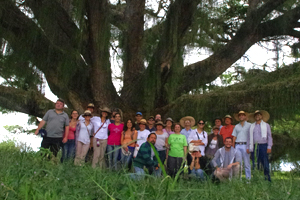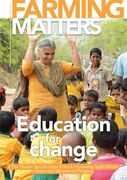The curricula followed by most universities in Latin America are organised along narrow disciplinary lines, separating the biophysical and socio-economic components of agro-ecosystems. This conventional pedagogical approach prevents students from fully understanding the complexities of the food and natural resource systems. SOCLA, the Latin American Scientific Society of Agro-ecology, is encouraging change with the Doctoral Programme run in collaboration with the Universidad de Antioquia, in Medellin, Colombia, and the Universidad Agraria Nacional in Managua, Nicaragua. The central tenet of these graduate programmes is that today’s food and agriculture systems need new leaders, born from programmes rooted in agro-ecological thought. This is the only way by which formal agro-ecological knowledge can keep pace with the innovative ideas and projects led by social movements and contribute to a scaling up of agro-ecology in the region.

For decades, Latin American agro-ecologists have advocated a radical transformation of the world’s agricultural systems, looking not only at the agronomic aspects but also at the social, political, cultural and economic forces that drive agricultural development. Rural movements such as Via Campesina have long argued that farmers need land to produce food for their own communities, and for this reason they advocate genuine access to and control over land, water and agrobiodiversity. SOCLA is convinced that the changes promoted by farmers and their organisations need to be complemented by a similar revolt within academic and research institutions.
SOCLA believes that incorporating the principles of agro-ecology (from plant health and soil ecology to land politics and food sovereignty) into the educational process is one way to correct the current agricultural educational deficiencies in our institutions. By focusing on the interface between agriculture, the social system and the global environment, agro-ecological thought can help design a more creative and integrated curriculum. This, in turn, can help students to develop new capacities, making them better prepared to face future challenges and to guide agriculture through a path that sustains productivity while conserving natural resources and biodiversity, in socially equitable, culturally plural and economically viable ways.
“There is no doubt that we need professionals who will look at yields and outputs, but in relation to the lack of opportunities in rural areas, equity and power issues, pollution and health, or land grabs. A programme like this one enormously helps us to reflect on what we know, and what we need to know, in order to improve agricultural production. We urgently need to develop new ways of ‘doing science’.
“I was first invited to join the group of lecturers in 2010, and every year I have presented what we have done and achieved in Cuba. I especially appreciate that all the students have a rich experience, and that we can work together on the basis of that experience. Every group is a new challenge, and every time I have enjoyed the discussions and the ideas that come from the groups. What I have liked most, however, is that working together gives me new insights and ideas. I am growing together with all the students.”
Fernando Funes Mozote lectures in both Medellin and Managua. Previously a researcher at Cuba’s Pasture and Forage Research Institute, he is, since December 2011, a farmer.
Ideas for new curricula
SOCLA’s doctoral programmes are made up of three modules, held in Medellin or Managua, each lasting a month, covering the scientific basis of agro-ecology (biodiversity, resiliency, etc.), sustainable rural development (traditional knowledge systems, rural movements, land reform) and research methods (indicators, experimental design). Training includes lectures by researchers such as Peter Rosset, Steve Gliessman and Eric Holt-Giménez, complemented with readings and group discussions, and presentations of written and oral reports. As it focuses on an “action learning” approach, the programme also involves farm internships. The internships are planed during term time, when all the students are together, but take place in the students’ home areas, where they work with local farmers and organisations. In preparation for their research, students are expected to carry out a thorough diagnosis, considering indicators for sustainability or resilience, and propose changes that will enhance farm stability in the face of external shocks. Research for a doctoral thesis must be conducted in the student’s country of origin and always involves looking at possible solutions to the key problems affecting rural livelihoods.
After graduation, students are expected to possess a strong theoretical background, with methodological, analytical and practical skills. We aim at graduates with the skills to decipher complex interactions and to design, manage and evaluate agro-ecosystems that are diverse and resilient. Graduates are expected to acknowledge the benefits of traditional forms of agriculture, and to be able to mobilise local skills, technologies and resources for endogenous development. An equally important aim is to develop skills to empower social groups, to propose enabling policies, and to systematise and evaluate local development experiences in order to set a scaling up process in motion.
Students and graduates
While the course in Nicaragua only started this year, a total of 45 students are part of the programme in Colombia, from 8 different countries. Most of them lecture at different universities, so it is expected that they will promote curricular changes in their own programmes by creating courses on agro-ecology and research along agro-ecological lines. Ph.D. students working in research institutions are expected to implement a research agenda that is tailored to the needs and circumstances of small-scale farmers, and that leads to alternatives to the industrial agriculture movement. Graduates from SOCLA’s agro-ecology doctorate will be active promoters of food sovereignty and the welfare of family farmers.
References
Altieri, M.A. and C.I. Nicholls, 2012. Agroecology: Scaling up for food sovereignty and resilience. Sustainable Agriculture Reviews 11: 23-37
Francis, C.A., 2008. Education in agroecology and integrated systems. Journal of Crop Improvement, 11: 21-43
Leon, T. and M.A. Altieri, 2010. Enseñanza, investigación y extensión en agroecología: La creación de un programa de doctorado latinoamericano de agroecología. In: Vertientes del pensamiento agroecológico. T. Leon and M.Altieri (eds). Universidad Nacional de Colombia, Bogotá.
Miguel A. Altieri serves as President of the Sociedad Científica LatinoAmericana de Agroecología (SOCLA). Clara I. Nicholls is the co-ordinator of the Latin American Doctoral Programme at Colombia’s Universidad de Antioquia. E-mail: agroeco3@berkeley.edu

